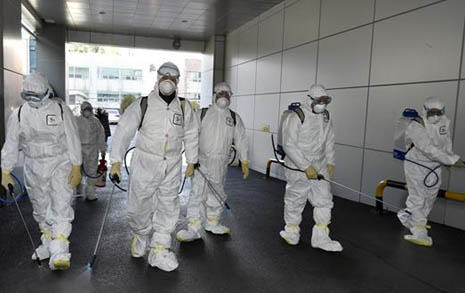
47화집단 유급, 총선 연기... 최악도 대비해야 한다
[똑경제-우석훈 박사] 추경, 정말 어려운 사람에게 가야
더 강하고 더 빈번해진다'판데믹'이라는 현상에 대해서 생태학이 관심을 가지고 수리 모델을 개발하던 것은 90년대 초중반 정도로 기억한다. 종의 이동과 관련된 모델의 후속 작업 같은 것이었다. 인간의 지역적 이동이 늘어나면서 ...
20.02.26 19:00 ㅣ 우석훈(wasang)

46화중국에도 뒤처진 플랫폼 경제, 그래도 희망은 있다
[똑경제-최배근 건국대 교수] 산업 재편 없이 소득주도성장은 지속 불가능
[1] '함정'에 빠진 세계 경제, 다음 쓰나미에 준비됐나[2] 한국 경제 분기점은 1992년, 그 때 잘 대응했더라면[3] '최순실 사태' 없었어도 보수 재집권 어려웠다[4] 데이터 경제로의 전환, 삼성·현대차의 명운 가른다[5]&n...
20.02.19 08:33 ㅣ 최배근(trustnet)

45화하품 나오는 부동산 공약들, 20대 국회 끝나 다행일 뿐
[똑경제-최은영 한국도시연구소 소장] 마지막까지 이토록 무능하다니
'그' 의원이 생각난 이유 박근혜 정부 때인 2014년 민간택지 분양가상한제를 실질적으로 폐지하도록 '주택법'을 개정할 때도, 건설업체 특혜 종합선물세트였던 '민간임대주택에 관한 특별법(뉴스테이법)'을 2015년 제정...
20.02.06 20:08 ㅣ 최은영(choiey6012)

44화일본인보다 덩치 큰 한국인, 체력은 바닥인 이유
[똑경제-우석훈 박사] 나는 평일에도 수영을 하고 싶다
주중에 수영하려면 강습권을 끊어라?내가 사는 동네는 서울 종로인데, 수영장 가기가 좀 어렵다. 전에는 송파구에 살았는데, 그 때는 지금보다 형편이 훨씬 나았다. 그 지역 민주당 구청장이 다른 건 몰라도 수영장 확보 만큼은 진짜 열심...
20.01.29 19:15 ㅣ 우석훈(wasang)

43화'플랫폼 경제'로 진화 못하면 일본처럼 망한다
[똑경제-최배근 교수] '이익 공유' 체질화 없이는 우리 미래도 없어
한국 경제 어려움의 중심에 제조업 위기가 작용하고 있다는 사실은 많은 사람들이 동의한다. 1단계 제조업 위기의 결과 제조업의 고용 역할이 약화되기 시작했고, 2단계 위기의 결과 생산액의 정체로 이어지고 있다. 3단계 위기는 제조업의 위상(존...
20.01.23 19:48 ㅣ 최배근(trustnet)

42화혁신적 포용국가? 그게 대체 무슨 말입니까?
[똑경제-황세원 LAB2050 연구실장] 실행이 담보되는 국가 비전 세우는 방법
"비전을 세우는 것이 먼저고, 세부적인 계획은 모두 그 뒤를 따라가는 것이다."이런 당연한 소리를 할 필요가 있을까? 있다. 적어도 한국에서는. 특히 정책이 만들어지고 실행되는 과정을 보면 그렇다. 비전이 보이지 않고, 있더라도 모호하거...
20.01.15 12:01 ㅣ 황세원(joonchigirl)

41화투기와의 전쟁... 당장 이것부터 실시하라
[똑경제-최은영 한국도시연구소 소장] 집값 상승 누구 책임인가?
누구를 위한 집값 상승인가새해까지 남은 10초를 거꾸로 세는 사람들의 함성, 보신각 종소리와 함께 시작하는 새해를 사람들은 들뜬 마음으로 맞는다. 하지만 해마다 돌아오는 1월을 살아남은 자의 슬픔으로 맞는 사람들이 있다. 2009년 1월 20...
20.01.09 14:39 ㅣ 최은영(choiey6012)

40화구중궁궐 밀실행정, 촛불 정부도 바뀐게 없다
[똑경제-우석훈] 문재인 정부 후반기, 성공적인 경제정책을 위하여
전임 대통령의 탄핵으로 극도로 혼동스러운 시기에 5월 대선과 함께 문재인 정부가 출발했다. 촛불 정부로 한참 인기가 높던 시절, 많은 사람들이 이 정부가 정책적으로 성공하기를 기원했던 것 같다. 이제 딱 절반을 돌아...
19.12.25 15:26 ㅣ 우석훈(wasang)

39화데이터 경제로의 전환, 삼성·현대차의 명운 가른다
[똑경제-최배근 건국대 교수] 제조업의 위기는 필연적
문재인 정부가 출범할 때 상황은 우리가 살고 있는 마을이 침수되지 않도록 오랫동안 사용해오던 둑이 무너져 물이 범람하며 사람과 살던 집이 물속에 잠기게 된 경우에 비유할 수 있다. 이런 상황에서 정부가 할 일은 무엇인가? 마을이 침수되...
19.12.23 08:20 ㅣ 최배근(trustnet)

38화'최저선' 없는 사회... 공포 속에 사람들이 죽어간다
[똑경제-황세원 LAB2050 연구실장] 하강하는 사람들을 떠받치려면
얼마 전, '가족 살해 후 자살' 사건들을 취재한 신문기자와 얘기 나눌 기회가 있었다. 한 때 '동반자살'이라고 불렸던, 어린 자녀를 포함한 가족들을 먼저 살해하고 스스로 목숨을 끊는 사건이 요즘도 계속 이어진다. '송파 세 모녀 사...
19.12.11 07:54 ㅣ 황세원(joonchigirl)

37화제철 만난 '종부세 폭탄론', 한 번 속지 두 번 속나
[똑경제-최은영 한국도시연구소장] 국민을 무시하는 언론의 행태
'오디오'가 아니고 '전축'이라 불리던 시절, 고장난 LP판을 틀면 판이 튀면서 똑같은 소절이 반복되곤 했다. 다시 소환된 노무현 정부 때의 '종부세 폭탄론'이 언론을 통해 무한 반복되고 있는 것을 보면서, 전축 바늘이 한 곳에 머물며 내던 그 기...
19.12.05 18:13 ㅣ 최은영(choiey6012)

36화차기 총리 인선에 대한 고언
[똑경제-우석훈 교수] 경제의 눈으로 본 총리 인선
요즘 총리 인선에 대한 얘기가 여의도에서는 가장 핫한 얘기인가 보다. 만나는 사람마다 이낙연 총리 후임에 대해서 한 마디씩 한다. 다 각각의 의견과 희망이 섞여 있는 얘기들이다.그러나 누가 총리가 되더라도, 집권 하반기를 향해 가는...
19.11.27 08:56 ㅣ 우석훈(wasang)

35화'최순실 사태' 없었어도 보수 재집권 어려웠다
[똑경제-최배근 건국대 교수] 박근혜 정부에서 막을 내린 박정희 모델
[최배근 칼럼 1] '함정'에 빠진 세계 경제, 다음 쓰나미에 준비됐나[최배근 칼럼 2] 한국 경제 분기점은 1992년, 그 때 잘 대응했더라면 일자리 증가율의 하락 및 노동소득 비중의 하락에 따라 내수 취약성이 구조화되면...
19.11.21 13:49 ㅣ 최배근(trustnet)

34화'워라밸' 외치는 사회, 노동시간 단축보다 중요한 것은?
[똑경제-황세원 LAB2050 연구실장] 그들이 지역으로 내려간 이유
"워라밸이라는 건 저희와는 어울리지 않는 말이에요."언감생심 그런 생각을 어떻게 하겠느냐는 맥락이 아니다. 그런 단계는 이미 지나갔다는, 아니 처음부터 그와 다른 차원의 고민을 하면서 살아왔다는 말이었다.지난 주말, 제주도에서 열...
19.11.13 08:25 ㅣ 황세원(joonchigirl)

33화"집값은 계속 오른다"는 가짜 카산드라들의 예언
[똑경제-최은영] 정확한 분석 없는 자기실현적 주장 불과
문재인 정부 주거정책을 저주하는 그들트로이의 카산드라 공주는 예언의 신 아폴론에게 예언 능력을 받았지만 그의 사랑을 거절해 다른 사람을 설득할 수 있는 능력을 빼앗겼다. '목마를 성안으로 들이면 트로이가 멸망한다'는 그녀...
19.11.06 18:08 ㅣ 최은영(choiey6012)

32화7급 이하 공무원은 '고졸'로 채용하자
[똑경제-우석훈] 고등학교만 졸업해도 잘 살 수 있는 사회 만들어야
대학을 위해서 살아가는 한국인들자본주의 사회에서 대학은 참 정의하기 어려운 기구다. 경제학자 개리 베커는 인간의 범죄는 물론 교육도 이익과 비용이라는 두 가지 기준으로 모두 설명하려고 했다. 인적자본이라는 관점에서 대학은 개인의 ...
19.10.30 18:04 ㅣ 우석훈(wasang)

31화한국 경제 분기점은 1992년, 그 때 잘 대응했더라면
[똑경제-최배근 건국대 교수] 제조업 비중 줄어드는 '탈공업화' 시작된 해
[이전 칼럼] '함정'에 빠진 세계 경제, 다음 쓰나미에 준비됐나 청년에게 미래가 보이지 않는 사회우리에게 몰려오고 있는 쓰나미에 대한 대비를 하려면 최소한 쓰나미가 어디에서 오고 있는지 알아야 한다. 의사가 환자를 치료하...
19.10.23 18:55 ㅣ 최배근(trustnet)

30화장기근속 우대 없는 사회, 단기근속 차별 없는 사회
[똑경제-황세원 LAB2050 연구실장] 청년들에게 '선택할 자유'를 보장하자
"도무지 이해가 안 돼요. 하도 주관이 뚜렷하니까 이제 반대까지는 하지 않지만, 실망감을 숨길 수가 없어서 대하기가 영 껄끄러워요. 대체 왜 편하고 좋은 길을 놔 두고 힘들고 불안정한 길을 가려고 하는 걸까요?"20~30대가 원하는 '좋은 일'...
19.10.16 14:34 ㅣ 황세원(joonchigirl)

29화분양가상한제 발목, 기재부는 아직도 박근혜 정권인가
[똑경제-최은영 한국도시연구소 소장] 주무부처 제쳐놓고 부동산 부양정책
박근혜 정부의 '빚내서 집사라' 정책의 실행자는 최경환 기획재정부 장관이었다. 주거 정책의 주무 부처는 국토교통부지만 기획재정부 장관으로 임명된 그는 '부동산 규제가 한 겨울에 여름옷을 입은 격'이라며 강력...
19.10.10 18:05 ㅣ 최은영(choiey6012)

28화황교안에게 묻고 싶다, 다시 '놀부의 경제학'인가
[똑경제-우석훈] '민부론' 들고나온 그에게 던지는 세가지 질문
꼭 선거 때면 진보 경제 표방하는 한국 보수자유한국당의 황교안 대표가 '민부론'이라는 이름으로 경제 정책에 대한 개괄적인 플랜을 보여주었다. 총선이 가까워지는데, 뭔가 정책적인 대결을 준비하는 일은 좋은 일이다.좀...
19.10.02 13:29 ㅣ 우석훈(wasang)

27화'함정'에 빠진 세계 경제, 다음 쓰나미에 준비됐나
[똑경제-최배근 건국대 교수] 2008년 금융위기 이후 '경제의 좀비화' 심화
지난 수십 년간 경제학 교수로 살아오면서 가장 안타까운 점은 경제적 재난이 닥칠 때 정치권의 무책임 때문에 정보가 부족하거나 판단 능력이 부족한 일반 서민들이 피해를 뒤집어쓴다는 것이다. 바다에서 지진이 발생하면 뒤이어 쓰나미가 몰려온...
19.09.25 14:29 ㅣ 최배근(trustnet)

26화고속도로 수납원들은 왜 톨게이트 위로 올라갔을까
[똑경제-황세원] 기술 변화 따른 일자리 감소 문제에 대한 사회적 해법
"톨게이트 노동자 문제를 어떻게 보세요?"얼마 전, 노동 문제와 관련된 일을 하는 분으로부터 들은 질문이다. 공식적인 자리는 아니었고 담소를 나누는 중이었는데도 그 질문에 즉답을 하기가 조심스러웠다.노동 분야에 경험과 식견이 ...
19.09.18 08:25 ㅣ 황세원(joonchigirl)

25화'상한제' 돌 던지는 사람들, 그땐 옳고 지금은 틀린가
[똑경제-최은영 한국도시연구소 소장] 머뭇거리면 감당 못할 집값 폭등 재앙 올 것
집값 폭등의 제도적 기반 '부동산 3법 개정' 지난 2014년 12월 31일 국회는 박근혜 정부의 이른바 '부동산 3법' 개정안을 통과시켰다. 이때 개정된 <재건축초과이익 환수에 관한 법률>은 재건축사업의 부담금을 3년간 면제...
19.09.11 20:05 ㅣ 최은영(choiey6012)

24화아무도 버리지 않는 사회를 향한 '개문발차'
[똑경제-우석훈] 한국, 기본소득의 최전선
기본소득은 누구에게나 일정 소득을 주자는 아주 간단한 원리 위에 작동되는 정책이다. '음의 소득세'라는 이름으로 닉슨 시절, 경제학자 밀턴 프리드먼의 제안에 의해서 진짜로 시행될 뻔했다.그 시절 논의의 영향으로 알래스카주에서 실...
19.08.22 14:03 ㅣ 우석훈(wasang)

23화제조업 대기업, 좋은 일자리 맞습니까?
[똑경제-황세원] 저성장 사회에서 '좋은 일자리' 만드는 방법
얼마 전 어느 회의에 갔다가 지역 경제단체 실무자에게서 들은 이야기다. 조선업 불황으로 한동안 비어 있던 도크에 일감이 하나 들어왔다. 급히 인력을 채용해야 하는데 조선업 경력이 있는 노동자들은 대부분 지역을 떠난 상황이었다. 원청 ...
19.08.14 08:10 ㅣ 황세원(joonchigirl)

22화최저임금만으론 역부족, '최고임금' 도입할 때다
[똑경제-김유선] 양자 동시 추진해야 소득 불평등 해소 가능
소득불평등이 빠른 속도로 확대되고 있다. 미국에서는 상위 1% 소득이 1980년 11%에서 2014년 20%로 증가했고, 상위 10% 소득이 34%에서 47%로 증가했다. 중간 40% 소득은 46%에서 40%로 감소했고, 하위 50% 소득은 20%에서 13%로 감소했다. 최상위...
19.08.07 07:59 ㅣ 김유선(yoosun)

21화자유무역으로 성공한 한-일, 자유무역 포기할 수 없다
[똑경제-김택환] 문재인 대통령과 아베 총리는 조건없는 대화를
세계화로 인한 자유무역으로 가장 경제적인 이익을 거두고 있는 나라들은 어떤 나라들일까?세계적인 복합미디어기업 베텔스만이 운영하는 베텔스만 재단이 지난해 '세계화 보고서 2018년', 부제로 '누가 세계화로 가장 큰 이익을 거...
19.07.31 10:58 ㅣ 김택환(twkim1127)

20화유승민이 발의한 법, 이 정도도 빨갛게 보이나
[똑경제-우석훈 생각] 19대 이어 20대 국회서도 잠자고 있는 사회적경제기본법
2008년 글로벌 금융위기 이후 전세계는 사회적 경제에 관한 투자를 늘려나가는 중이다. 우리나라에도 관련된 기본법이 19대 국회에 올라갔었다. 당시 여당이었던 새누리당의 원내대표인 유승민이 발의한 것이라서, 당연히 통과되는 줄 알...
19.07.25 15:40 ㅣ 우석훈(wasang)

19화정규직·비정규직이란 말, 이젠 버려야 하는 이유
[똑경제-황세원] '비정규직 정규직화' 관련 갈등의 원인과 문제점
"우리 주위의 모든 일자리 중에서 정규직 일자리는 몇 퍼센트나 될까요?"강의 등 여러 사람들 앞에서 말할 기회가 있을 때마다 이런 질문을 한다. 파트타임, 임시직, 공공부문의 재정 일자리를 다 포함해서 묻는 것이라고 부연설명을...
19.07.17 08:35 ㅣ 황세원(joonchigirl)

18화최저임금 때문에 고용참사? 그 입 다물라
[똑경제-김유선] 최저임금 인상의 임금, 고용, 소득 효과
2020년 최저임금 결정이 오늘 내일 하고 있다. 노동계는 최저임금 1만 원, 다시 말해 1650원(19.8%) 인상을 요구하고 있고, 재계는 거꾸로 8천 원, 즉 350원(4.2%) 삭감을 요구하고 있다. 2020년 최저임금이 노사 양쪽 요구 중 어느 하나를 고스란...
19.07.10 07:51 ㅣ 김유선(yoosun)

17화한일 경제전쟁, 깨어있는 시민이 나서야
[똑경제-김택환] 독일 성모교회의 재건이 한일관계에 던지는 교훈
1945년 2월, 2차 세계대전이 막바지로 치닫고 수많은 피란민들이 독일 드레스덴으로 몰려들기 시작했다. 이들은 대학도시 하이델베르크처럼 폭격이 없을 것이라는 희망을 품었다. 드레스덴은 군사 산업도시가 아니었기 때문이다. 하지만 이들의 기...
19.07.03 10:17 ㅣ 김택환(twkim1127)

16화오죽하면 천하의 김상조가 친 삼성 소리를 들을까
[똑경제-우석훈 생각] 신임 청와대 정책실장에게 보내는 편지
신임 김상조 청와대 정책실장님. 실장님을 형이라고 불러야 할지, 선배라고 불러야 할지, 좀 애매하기는 합니다. 호칭이야 어떻든, 우선 축하드립니다. 장하성 선생님하고는 학교에서 자주 보면서 조그만 토론모임 같은 거라도 하면 ...
19.06.26 08:18 ㅣ 우석훈(wasang)

15화고용위기에 수천억, 그 돈은 다 어디로 갔을까
[똑경제-황세원] 같은 조선소 폐쇄, 스웨덴 말뫼와 전북 군산의 서로 다른 위기 해법
"실직자 한 명 한 명에게 맞춤형 지원을 했지요. 아, 맞춤형(tailored)이라는 말의 뜻을 아시죠?"지난해 10월, 스웨덴 말뫼에서 일마 리팔루 전 시장을 인터뷰하고 있을 때였다. 100년 넘게 도시 경제를 지탱했던 조선업이 붕괴되고 노동자 수...
19.06.19 08:47 ㅣ 황세원(joonchigirl)

14화'소주성' 비판한 박정수 교수와 보수언론의 치명적 오류
[똑경제-김유선] 성장에 못 미치는 임금인상, 문제는 물가통계 아닌 임금통계
노동 문제에 관심을 갖기 시작한지 40여 년이 지났다. 돌이켜보면 노동조합이 가장 잘 나갔을 때가 1990년대 초반이었던 것 같다. 그때는 매년 봄 임금교섭을 '한 해 농사'라 불렀다. 임금교섭 시기만 되면 경총 등 재계에서는 '생산성 오른 만큼만...
19.06.12 08:15 ㅣ 김유선(yoosun)

13화홍준표-유시민 '홍카레오'가 아쉬운 까닭
[똑경제-김택환] 포퓰리즘 4.0 시대, 포털 규제와 공영방송이 해야 할 일
독일을 포함해 유럽에서 '포퓰리즘 4.0'에 대한 비판이 거세다. 신문, 방송, 인터넷을 거쳐 유튜브 등 SNS가 대세를 이루면서 '사실과 진실'보다는 '주장과 선동'이 난무하기 때문이다. 가짜 뉴스도 홍수를 이룬다. 오죽하면 독일은 가짜뉴스를 공...
19.06.05 08:57 ㅣ 김택환(twkim1127)

12화토건예산의 손톱만큼만 작가에 투자해보자
[똑경제-우석훈 생각] 경제 성장 패턴의 새로운 시각
내가 학부에서 경제학 배우던 시절에는 '노동집약형 산업'과 '자본집약형 산업' 정도만 배웠다. 지난 해 노벨경제학상을 받은 폴 로머 등의 내생성장론이 등장하면서 기술, 제도, 지식, 이런 것들이 성장의 주요 요소로 분석되기...
19.05.29 08:01 ㅣ 우석훈(wasang)

11화'복제 도시'에 살 것인가, '원본 도시'를 만들 것인가
[똑경제-황세원] 공공기관 지방 이전 정책의 실효성을 묻다
지난해부터 지방 제조업 일자리에 대한 연구를 위해 전국을 다니고 있다. 그러던 중 깨달은 것 하나가 '복제'의 매커니즘, 그리고 그에 걸리는 시간에 대한 것이다.우선 이 이야기를 꺼내려면 필자가 일간지 기자로 일하던 시절 알게...
19.05.22 12:07 ㅣ 황세원(joonchigirl)

10화우리 노동시장이 경직됐다는 새빨간 거짓말
[똑경제-김유선] 전경련의 주장이 말도 안 되는 까닭
10년 전에는 정부와 재계에서는 입만 열면 '한국의 고용보호수준이 높고, 노동시장이 경직적'이라고 얘기했다. 하지만 요즈음은 그런 얘기 잘 안 한다. 사실이 아님이 분명해졌고, 자칫하면 망신당하기 딱 알맞기 때문이다. 기껏해야 '전체 노동시...
19.05.15 07:58 ㅣ 김유선(yoosun)

9화청년일자리 해결에 올인하라
[똑경제-김택환] '청년 완전고용' 독일에서 배워야 할 것들
"청년이 죽으면 민족이 죽는다."독립운동가로 청년운동에 앞장 선 도산 안창호 선생이 한 말이다. 한 나라에 청년이 얼마나 중요한 지를 잘 표현한 문장이다. 100년 전 이 땅의 청년들 미래는 그야말로 암울했다. 무능한 봉건 왕조는 몰락했고,...
19.05.08 08:18 ㅣ 김택환(twkim1127)

8화2020년 총선, 민주당은 '왜?'에 답해야 한다
[똑경제-우석훈의생각] 더 이상 분노만으로는 안돼... 정책의 실종을 우려함
2020년 4월 5일에 총선이 열린다. 많은 사람들이 늘상 대통령 선거만을 보지만, 정치는 물론이고 사회의 중요한 변화는 총선과 지방선거에서 많이 나온다. 지난 2016년 총선으로 더불어민주당은 제1당이 되었다. 그 흐름을 ...
19.05.02 08:05 ㅣ 우석훈(wasang)

7화첫 직장에서 장기근속? 그럴 수 있는 사회입니까?
[똑경제-황세원] 정부와 기성세대가 낸 정책에 '청년'이 되묻다
정책에는 눈이 있다. 사회 현상을 어떻게 바라보는지에 대한 '관점'이 들어있는 것이다. 최근 현 정부가 내놓은 청년 정책을 보면 바로 그 관점을 볼 수 있다."청년(또는 청소년)은 학교를 졸업한 뒤 최대한 빠르게 '첫 직장'에 들어가서 ...
19.04.24 08:56 ㅣ 황세원(joonchigirl)

6화최저임금이 너무 올랐다고 생각하는 사람들 보시오
[똑경제-김유선] 그들을 위한 이론과 실증분석 맞춤 강의
많은 사람들이 최저임금을 저임금 노동자에게 공정한 임금을 보장하고, 임금불평등을 완화하고, 소득분배구조를 개선하는 바람직한 제도라고 생각한다. 하지만 모든 사람이 그렇게 생각하는 것은 아니다. 고용에 부정적 영향을 미치는 바...
19.04.17 11:24 ㅣ 김유선(yoosun)

5화'오마하의 현인' 워런 버핏의 북한 투자를 기대한다
[똑경제-김택환] 버핏의 북한 투자는 비핵화와 개혁 개방을 앞당길 것
세계 최고 부자 중 한 명인 투자회사 버크셔 해서웨이의 워런 버핏 회장은 저가인 2만 원 짜리 삼성전자의 폴더 폰을 아직 사용하고 있는 것으로 알려지면서 세계적인 화제를 불러 일으켰다. 이는 지난 3월 28일 미국의 경제방송인 CNBC와의 인터뷰...
19.04.10 08:49 ㅣ 김택환(twkim1127)

4화'집 없는 사람' 45%, 고위공직자 쿼터제를 제안함
[똑경제-우석훈의생각] 김의겸 전 대변인과 장관 후보자 사퇴를 바라보며
청와대 대변인이 재건축 건물 매입 문제로 결국 사퇴를 했다. 그 여파로 청문 보고서를 기다리던 장관 두 명이 결국 낙마했다. 나는 이번 사건이 현 정부 출범 이후 최대의 사건이라고 생각한다. 엄청난 불법이 있거나, 돈의 규모가 크기 때문...
19.04.03 12:03 ㅣ 우석훈(wasang)

3화"장래희망? 건물주요" 대답에 어른들이 해야 할 일
[똑경제-황세원] 수천억짜리 청년일자리 대책이 먹히지 않는 진짜 이유
지난해 고등학생 대상으로 '좋은 일의 기준'에 대해 강의한 적이 있었다. 강의 중에 "대한민국에서 월급 200만 원 정도 받는다면 전체 일하는 사람 중에서 중간쯤 되는 것이다"(2017년 임금근로자 중위소득 210만 원, 통계청)라고 설명했더니, 몇몇...
19.03.27 08:40 ㅣ 황세원(joonchigirl)

2화언론이 말하지 않는 최저임금 인상의 진실
[똑경제-김유선] 최저임금인상 2년 효과... 임금 불평등 줄고, 저임금 계층 감소했다
문재인 정부가 출범한지도 꼬박 두 해가 다 되어 간다. 지난 2년 동안 언론에서 두드러진 변화를 꼽으라면, '기승전 최저임금'이란 말이 생길 정도로 하루가 멀다 않고 최저임금 보도가 쏟아진 점일 게다. 그러다보니 2017년 대통령 선...
19.03.20 08:54 ㅣ 김유선(yoosun)

1화토건 이긴 정권 없었다 이제 탈토건 위원회를 만들자
[똑경제-우석훈의 생각] 지역숙원사업, 삭발, 상경투쟁 언제까지 할 셈인가
진보와 보수라고 표현하든, 좌우라고 표현하든, 한국에도 여야 개념이 있고, 정권교체라는 말이 있다. 그리고 정치가 바뀌는 것만큼 경제에도 변화가 있을 것이라고 사람들은 기대를 한다. 지난 주말 종로를 지나가면서 우연히 태...
19.03.13 11:54 ㅣ 우석훈(wasang)














 Let us recall how the death of others is experienced. In the case of our family and personal friends, we rehearse our memories of them, we cherish objects associated with them. For those who have had a more general impact, we remember their works: the companies they built, the devices they invented, the treaties they signed, the books or music they composed.
Let us recall how the death of others is experienced. In the case of our family and personal friends, we rehearse our memories of them, we cherish objects associated with them. For those who have had a more general impact, we remember their works: the companies they built, the devices they invented, the treaties they signed, the books or music they composed. Where is the self in all this?
Where is the self in all this? 